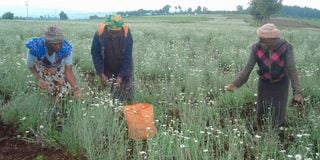Pyrethrum remains safe organic pesticide, study reveals

Workers harvest pyrethrum at the Kenya Agricultural and Livestock Research Organization (Kalro) in Molo, Nakuru County on August 6, 2021.
Even as farmers grapple with unsettling news of fake fertilisers and other inputs, a new investigation has revealed yet another shocker for Kenyans.
A report published in EU Observer, a digital newspaper in Brussels, a non-profit entity revealed that Kenyan farmers predominantly dependent on subsistence agriculture, are utilising pesticides containing Imidacloprid, a substance recognised for its detrimental effects on bees.
Subsequently, a director of the Pyrethrum Processing Company of Kenya (PPCK) Justus Monda has appealed to the government to support the full revival of the struggling crop so that it can provide a safer remedy for pesticide control.
“Pyrethrum has limited toxicity at low doses. Pyrethrum has been used for centuries as an insecticide, and pyrethrins content in the plant is the world's most widely used plant-based insecticide ingredient,” said Mr Monda.
He added: “Pyrethrum is a natural insecticide with very low mammalian toxicity that leaves no chemical residue and is, therefore, the natural, safe and effective choice for use in the home, on your crops and in any area where humans may eat, sleep or play.”
The official said many Kenyan farmers in the 19 pyrethrum-growing counties were willing to increase their acreage under pyrethrum to enable the Nakuru-based factory to run around the clock.
Currently, the underutilised Nakuru factory crashes dry flowers once a month as it awaits deliveries from farmers.
“This situation of waiting for flowers to accumulate should not happen and that is why I urge the government to support the industry so that farmers can get planting materials, particularly at this time of the year when rains are pounding most of the pyrethrum growing regions in Kenya,” said Mr Monda.
Genetically modified goods are banned in Kenya and according to the report, yet the toxins continue to flood the Kenyan market with the majority of the products being produced by companies located in Germany, China, and India.
In Kenya, subsistence farming is heavily relied upon, and utilising agricultural inputs such as fertilisers and pesticides is crucial for enhancing farmers’ earnings.
However, very few farmers use pyrethrum which has advantages over other insecticides from Europe given that it has a repellent effect on insects, exhibits rapid “knockdown” and is non-persistent in the environment.
At the same time, the report further revealed an annual importation of 18,000 tonnes of agricultural products with minimal quality restrictions land in the country.
Some of the products that are flooding Kenyan markets have far-reaching effects and cited the use of products containing Imidacloprid that resulted in a notable decline in the bee population in Germany.
Henry Muriuki, a spokesperson for the Kenya Organic Agriculture Network quoted in the explosive report said he had observed a decrease in insect populations, leading certain farmers to resort to manual pollination of their crops.
Bees have cultural and environmental importance as pollinators and producers of honey and other healthy medicinal products.





